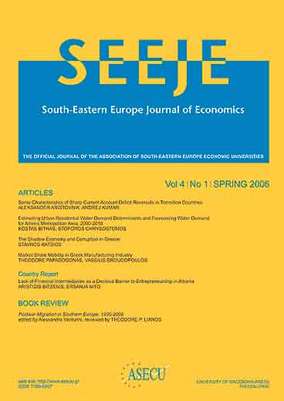Business cycle synchronization between the Bulgarian economy and the European Union
Part of : SEEJE ; Vol.8, No.2, 2010, pages 171-185
Issue:
Pages:
171-185
Author:
Abstract:
This paper analyzes the level of economic convergence within the EU and in particular within the EMU. The main purpose is to assess the level of business cycle synchronization between Bulgaria and the Eurozone. The research is conducted with data for the period 1995-2009 divided into two subsamples: 1995-2001 and 2002-2009. Business cycles are identified through detrending of GDP time series with Baxter-King and Hodrick-Prescott filters. The empirical results of this paper reveal that in the period 1995-2002 Bulgaria did not form an Optimum Currency Area with any of the EMU members and possibly suffered severe negative effects from the introduction of the Currency Board in 1997. The findings for the second sub-period 2002-2009 suggest that the introduction of the Euro in Bulgaria will be highly beneficial because of the high level of synchronization of its business cycle fluctuations with the Eurozone.
Subject (LC):
Keywords:
business cycle synchronization, EU integration, currency unions, optimum currency area, economic development, economic convergence
Notes:
Περιέχει πίνακες, σημειώσεις και βιβλιογραφία, An earlier version of this paper was presented during the 6th International Conference of ASECU, held in Podogorica, May 20-22, 2010, JEL Classification: E32, E42, E50




